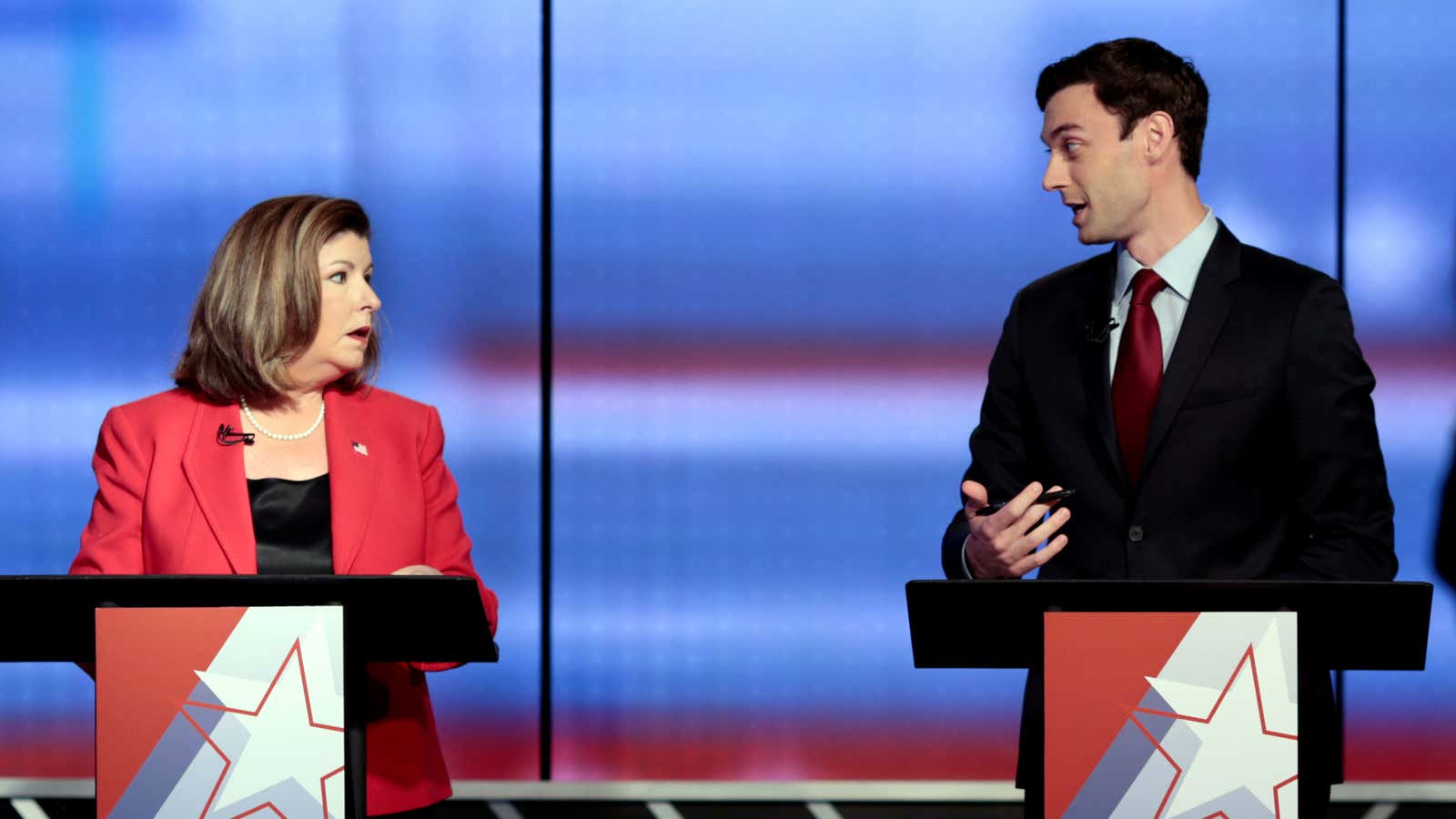It’s meant to choose the winner in just one of 435 congressional districts across the United States, but the outcome of an election today (June 20) in suburban Atlanta could put the brakes on the entire Republican legislative agenda promoted by US president Donald Trump.
The sixth district was until this year represented by Tom Price, a Republican lawmaker who was tapped by Trump to become as US secretary of Health and Human Services. The scramble to replace him has been entirely influenced by the unpopularity of the new president—despite the fact that Price has never collected less than 60% of the vote in 14 years of elections, the Democratic candidate has a chance to flip the district.
Jon Ossoff, a 30-year-old former legislative staffer who was raised in a nearby Georgia community, is the Democratic standard-bearer. A novice campaigner, he has surged on the back of anti-Trump sentiment and attacks on the unpopular health care bill passed by House Republicans.
His opponent is Karen Handel, a former county official and Georgia secretary of state who has accepted Trump’s backing and articulated a fairly typical “God, gays, and guns” campaign—she has made clear her opposition to same-sex adoption, while her allies have attempted to tie Ossoff to the shooting of several Republican lawmakers and aides last week in Washington.
Polls have a notoriously tough time with special elections and their unpredictable electorates, but they show the vote just about tied, with perhaps a slight edge for Ossoff. He won 48% of the vote in an open primary in April. That election set up today’s run-off because no candidate cleared a true majority; Handel won 20% of the vote in a crowded Republican field.
Last fall, Hillary Clinton lost to Donald Trump in the district by just one percentage point. For comparison, Mitt Romney beat Barack Obama there by 28 percentage points. Now, Democrats are asking if the deep recession in Trump’s popularity since November will be felt here and by Handel, just enough to get their nominee over the line.
If Ossoff wins this conservative district, which was once represented by Newt Gingrich, the result will be far more than just one fewer vote for Republicans in the House. (Remember, the Republican health care bill passed the House by just one vote.) It will also be a signal to other lawmakers that Trump has indeed become electoral poison in the kind of affluent suburban districts where Democrats hope build an anti-Trump majority among white professionals inclined to back the GOP but turned off by Trump’s vulgarity and incompetence.
Republican incumbents are sure to be less likely to go out on a limb to support their already-teetering legislative agenda if there is real evidence it will cost them their jobs. But if Ossoff loses, expect the liberal handwringing about the Democratic party’s leadership to spread.
Ossoff hasn’t followed the progressive playbook when it comes to political messaging, declining to embrace single-payer healthcare or to make inequality central to his message. If he fails, it’s likely that Bernie Sanders-backing Democrats will use the loss to promote the idea that the party still needs a major revamp of its rhetoric.
A failure for the Democrats here isn’t the end of their quest for gains in the legislature—the seat is not among the 23 Republican-held districts won by Clinton last year, though it is a top target proposed by electoral analyst Charlie Cook.
Victory, however, would put wind at the back of the opposition party, something shiny to show fundraisers as they prepare for what will be a very expensive electoral fight in 2018. Democratic political operative have been talking about an anti-Trump wave sweeping the country, but until they bring home the goods, their credibility remains somewhere around Nov. 9, 2016, levels. Conversely, a win for Handel will embolden those Republicans who think they can hold on until this whole Trump thing blows over.
The high stakes can be seen in the money that both parties are pouring into this race, which in May became the most expensive congressional election ever. With more than $57 million spent so far, there is no sign the cash flow will slow. Ossoff in particular has benefitted from amped-up small donors, raising more than $23 million himself, while Handel has only raised $4.5 million. But outside spending by political action committees has benefitted Handel, with $18.2 million in her favor to Ossoff’s $8 million.
